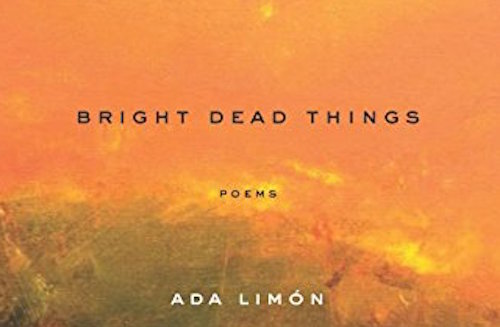'There is also a radical hope': Ada Limón Talks With The Rumpus Book Club

Ada Limón talks with The Rumpus Poetry Book Club about her new book Bright Dead Things (Milkweed Editions). Limón discusses her influences: "The title is from the poem, 'I Remember the Carrots.' But more than the actual line, I was looking for something that spoke to the idea of both living and dying. How death makes living all the more vivid and real. And how we are those Bright Dead Things…." Here's more from the edited transcript:
Brian S: In your comment about your influences, you said “my willingness to write love poems.” Do you think there’s a pressure not to write those anymore? Has the push against sentimentality in poems made it so that we’re rebelling if we write them?
Ada Limón: Rachel. That is so wonderful. You have to realize, I just got my copies YESTERDAY, so I am still all aflutter with the fact that you’ve all read it already! It’s thrilling and also it’s making my heart beat real fast right now. I like that you said “effortless” as opposed to “easy” because I was really interested in saying things as truthfully as possible and then making sure the sound and rhythm were there. Also, for the longest time I wasn’t writing a book, I was just doing what poets do: write poems. So there was a lot of space between each poem. Also, I should add, I have a marvelous editor at Milkweed Editions (Wayne Miller) who really gets my voice and has a great eye for what I’m doing. He didn’t actually make that many changes to the order, but he did fix a few lines here and there and I’m grateful. Oh, and I should add that I send every first draft of every poem to a few very dear key people in my life, and I almost always take their suggestions.
Rachel: The book, of course, feels incredibly rigorous—not easy!!—but it isn’t stumbling all over its own artifice. It’s a really impressive collection.
Ada Limón: Sigh. Yes. Love poems. LOVE POEMS. How weird it is to even say. I was afraid that once I was in a good relationship, I’d never write again (drama being essential to my inner poet), but instead the love poems came. They are scary to write. What if you write a great love poem, like a really great love poem, and then it ends? What if you write one and then you don’t feel that way anymore? What if you write it and then everyone judges you for being sticky sweet and naive? Yeah. It’s a risk isn’t it? I always say, take the risk. I suppose I’d always rather risk sentimentality than not saying anything. I’d rather you disagree with me than not having any idea what I said in the first place. I think, we need to remember that there is a language for joy, too. We get so caught up in sad poems, in darkness, but there is also praise, there is also a radical hope.
Brian S: I imagine as well that this is another one of those advantages for men. If a man writes a love poem, he’s breaking the stereotype by showing vulnerability, whereas if a woman does it, well, she’s doing it because feelings.


